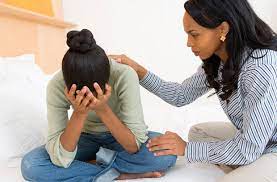Anxiety is one of the most common mental health issues in the United States, and it can affect people of all ages. Teens are particularly vulnerable to anxiety disorders, which can lead to problems at school, with friends, and in other areas of their lives. In this blog post, we will discuss what parents need to know about anxiety in teens. We will cover symptoms, treatment options, and ways to help your teen manage their anxiety.
Contents
Understanding Anxiety In Teens
 If you are a parent of a teenager, you may have noticed that your child seems more anxious than usual. Maybe they’re worried about school, friends, or family. Or maybe they seem on edge all the time. As a parent, everyone wants their child to be happy and healthy, so it can be scary to see them going through something like anxiety.
If you are a parent of a teenager, you may have noticed that your child seems more anxious than usual. Maybe they’re worried about school, friends, or family. Or maybe they seem on edge all the time. As a parent, everyone wants their child to be happy and healthy, so it can be scary to see them going through something like anxiety.
Anxiety is a normal emotion that everyone experiences at some point in their life. It’s what we feel when we’re worried or nervous about something. For most people, anxiety is fleeting and goes away once the situation has passed. But for some people, anxiety can be constant and interfere with their daily life. This is called an anxiety disorder.
Anxiety disorders are the most common mental health condition in the United States, affecting 40 million adults each year. And of those 40 million adults, one in eight are teenagers. That means that every day, around five million American teens are dealing with an anxiety disorder.
In fact, this Covid-19 pandemic has increased anxiety in teens. A recent survey found that anxiety and depression rates among teenagers have increased by over 50% since the pandemic started. This is likely due to a combination of things, like social isolation, uncertainty about the future, and worries about contracting the virus.
If you’re a parent of a teenager with anxiety, you might be wondering what you can do to help. So, there are help and several steps that you can take to help anxiety in teens.
Symptoms Of Anxiety In Teens
The symptoms of anxiety in teens usually manifest themselves in different ways than they do in adults. For example, while adults may experience anxiety as feeling tense or nervous, teens are more likely to express their anxiety through physical symptoms.
Some of the most common physical symptoms of anxiety in teens include:
- Headaches
- Stomachaches
- Muscle tension
- Fast heartbeat
- Sweating
- Shortness of breath
- Trouble sleeping
These physical symptoms can be accompanied by emotional symptoms as well, such as:
- Irritability
- Agitation
- Restlessness
- Fatigue
- Difficulty concentrating
- Worrying excessively about things that haven’t even happened yet.
As you can see, the symptoms of anxiety in teens can be quite varied. If you’re concerned that your teen may be suffering from anxiety, the best thing to do is to talk to them about it. In fact, these conversations can be some of the most important ones you have with your teen.
If you’re not sure how to start the conversation, try saying something like, “I’ve noticed that you seem to be really stressed out lately. Is there anything you want to talk about?” By showing your teen that you’re there for them and ready to listen, you can help them feel more comfortable opening up to you about their anxiety. Try seeking professional help to get an accurate diagnosis.
Causes Of Anxiety
 The causes of anxiety in teens and adults are different in some ways, but also overlap in others. That said, here are some of the most common causes of anxiety:
The causes of anxiety in teens and adults are different in some ways, but also overlap in others. That said, here are some of the most common causes of anxiety:
Genetics
If you have a family member who suffers from anxiety, you’re more likely to suffer from it as well. This is due to both nature and nurture; genetics play a role, but so does observing and learning from a family member’s anxiety. In fact, researchers have found that children of parents with anxiety are more likely to develop the condition even if they don’t have the genes for it.
Life Experiences
Certain life experiences can trigger anxiety. For example, if you’ve experienced trauma or abuse, you’re more likely to suffer from anxiety. Other stressful life events, such as:
- the death of a loved one
- a divorce
- moving to a new town or school
- can also trigger anxiety
Anxiety can also be caused by medical conditions, such as:
- heart disease
- diabetes
- thyroid problems
- respiratory disorders
- substance abuse problems.
If you’re suffering from anxiety, it’s important to talk to your doctor to rule out any underlying medical conditions.
Brain Chemistry
 Anxiety can also be caused by imbalances in brain chemistry. In teens, it is already known that the brains are still growing and changes in brain chemistry are normal. However, for some people, these changes can cause anxiety. In fact, anxiety disorders are the most common mental health problem in teens.
Anxiety can also be caused by imbalances in brain chemistry. In teens, it is already known that the brains are still growing and changes in brain chemistry are normal. However, for some people, these changes can cause anxiety. In fact, anxiety disorders are the most common mental health problem in teens.
While the exact cause of your teen’s anxiety may be unknown, there are many things that can contribute to it. So, it is kind of difficult to say what “causes” anxiety. But with the right diagnosis by a mental health professional. You will be able to find the best treatment plan for your teen.
Negative Impacts Of Anxiety
Anxiety can have a negative impact on many aspects of a teen’s life. Some of the consequences include:
Poor performance in school
Anxious students may have difficulty concentrating in class and completing assignments, which can lead to lower grades. Also, your teen may avoid going to school altogether if they are anxious about social interactions or tests. Moreover, anxiety can lead to chronic absenteeism, as some teens may be too anxious to even step foot in school.
Problems with friends
Anxiety can also make it hard for your teen to interact with their peers. They may avoid social situations altogether, or they may seem withdrawn and shy when they are around other people. As a result, your teen may have fewer friends or may be teased by other kids. In fact, anxiety causes your teen to shy away from activities they once enjoyed. For example, if your teen loved playing soccer but is now anxious about being around other people, they may stop playing altogether.
Health problems
Anxiety can lead to physical symptoms such as headaches, stomachaches, and insomnia. Teens with anxiety may also engage in unhealthy behaviors like skipping meals, using drugs or alcohol or self-harming. Because these unhealthy coping mechanisms can become addictive, it’s important to get help for your teen as soon as possible.
Isolation
 Anxiety can cause teens to withdraw from friends and activities they enjoy. This isolation can perpetuate the cycle of anxiety, as your teen may start to believe that they are truly alone in their struggle. In fact, anxiety is one of the most common mental health disorders, so your teen is certainly not alone.
Anxiety can cause teens to withdraw from friends and activities they enjoy. This isolation can perpetuate the cycle of anxiety, as your teen may start to believe that they are truly alone in their struggle. In fact, anxiety is one of the most common mental health disorders, so your teen is certainly not alone.
Physical problems
Anxiety in teens can also lead to more serious physical problems like:
- heart disease
- high blood pressure
- chronic pain
Physical problems at this age are not good. Because it will become more difficult to manage as your teen gets older.
If you think your teen may be struggling with anxiety, don’t hesitate to reach out for help. There are many resources available to families, and treatment can make a world of difference in your teen’s life.
Tips To Help Your Child With Anxiety
There are a few things that you can do as a parent to help your child deal with anxiety. So, here are several tips that you can implement at home:
Talk to your child about their worries
This is the foremost step in helping your child deal with anxiety. As a parent, you need to know what is causing your child anxiety. Only then can you help them effectively deal with it. Also, be open to them and let them know that it is okay to feel anxious sometimes. This will help them feel more comfortable talking to you about their anxiety.
It is important to make them feel comfortable because teens are already shy. And they feel like they are the only ones feeling this way. When you show them that it is okay to feel this way, they will be more likely to open up to you.
Encourage healthy coping mechanisms
Once you know what is causing your child anxiety, you can help them develop healthy coping mechanisms. This can include things like relaxation techniques, exercise, and journaling. It is important to encourage your child to find what works for them and stick with it. You can also help by modeling healthy coping mechanisms yourself.
Moreover, try to avoid putting pressure on your child or making them feel like they need to be perfect. This can only aggravate anxiety. Instead, show your support and let them know that you are there for them no matter what.
Encourage positive self-talk
 One of the most important things you can do for your child is to encourage positive self-talk. This means teaching them how to speak kindly to themselves, rather than putting themselves down. This is an important skill that will help them throughout their lives.
One of the most important things you can do for your child is to encourage positive self-talk. This means teaching them how to speak kindly to themselves, rather than putting themselves down. This is an important skill that will help them throughout their lives.
Encourage your child to come up with a list of things they are proud of about themselves. This could be anything from getting good grades to being a good friend. Help them to see all the wonderful qualities they have, and remind them of these when they are feeling down about themselves.
Be a role model for your child
If you’re a parent, your teens are watching you and seeing how you deal with stress and anxiety. If you’re constantly worried, stressed out, or angry, your teen is more likely to develop anxiety. Show them how to cope in a healthy way by staying calm under pressure, talking through problems instead of getting upset, and taking care of yourself.
In fact, practice relaxation techniques by yourself to help lower your stress levels and be a better role model for your teen. Once you’ve mastered some relaxation techniques, teach them to your teen so they can use them when they’re feeling anxious.
Promote good sleep hygiene
It is essential to get enough sleep when managing anxiety. Most teens need around eight to ten hours of sleep each night. There are a few things you can do to promote good sleep hygiene:
- Establish a regular sleep schedule
- Keep electronics out of the bedroom
- Avoid caffeine and sugar before bedtime
- Get up and move around during the day
- Relax before bedtime with a bath or reading
Promoting good sleep is important for teens. As anxiety can keep them up at night, having a regular sleep schedule can help. Also, it is important to keep electronics out of the bedroom and to avoid caffeine before bedtime. And, getting up and moving around during the day can help them relax before bedtime.
Nowadays, almost every teen has some form of social media, whether it be Facebook, Twitter, Instagram, Snapchat, or any other site. While social media can be a great way to keep in touch with friends and family. It can also be a major source of anxiety for teens. You can help your teen manage their anxiety is to teaching them healthy use of social media.
This means setting limits on how much time they spend online, who they are interacting with, and what kind of information they are sharing. You can also help them by modeling healthy social media habits yourself.
Appreciate them instead of criticisms
In anxiety, the brain is hardwired for threat detection. This means that when your teen’s anxiety is triggered, their brain immediately starts looking for things that could go wrong. As a result, they may become withdrawn or seem uninterested in things they used to enjoy. It’s important to avoid reacting to these changes with criticism or pressure to “snap out of it.”
Instead, try to express your understanding and support. And appreciate their little efforts. For example, if your teen used to play soccer but has now lost interest, don’t try to force them to keep playing. Instead, find other activities they might enjoy and be supportive of their decision.
Seek professional help
 If your child is struggling with anxiety, it’s important to seek professional help. A therapist can help your child understand and manage their anxiety. If your child is having difficulty in school or their social life, a therapist can also provide support and guidance.
If your child is struggling with anxiety, it’s important to seek professional help. A therapist can help your child understand and manage their anxiety. If your child is having difficulty in school or their social life, a therapist can also provide support and guidance.
There are a number of different treatment options for anxiety, so it’s important to work with a therapist who can tailor a treatment plan to your child’s specific needs. If you’re not sure where to start, contact Mantra Care, it is a great resource for finding mental health professionals in your area.
Conclusion
To conclude, anxiety in teens is a real and pressing issue. As parents, it is important to be aware of the signs and symptoms of anxiety in teens, as well as the potential causes. If you are concerned that your teen may be struggling with anxiety, reach out to a mental health professional for help. With proper diagnosis and treatment, most teens with anxiety can learn to manage their symptoms and live happy, healthy lives.
For more information, please contact MantraCare. Anxiety is a common mental health condition characterized by persistent feelings of worry, fear, and apprehension. If you have any queries regarding Online Anxiety Counseling experienced therapists at MantraCare can help: Book a trial Anxiety therapy session


